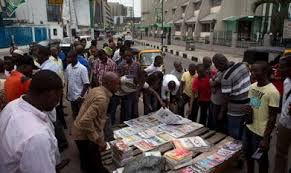The concerns raised by Nigerian industry experts on strategic interest between the Nigerian president and his Niger counterpart and the charge by the Nigerian Association of Pharmacists and Pharmaceutical Scientists in the Americas to the Nigerian government to prioritise indigenous production of vaccines for COVID-19 and other diseases are some of the leading stories in Nigerian newspapers on Thursday.
The Guardian reports that the sincerity of President Muhhamdu Buhari’s roadmap on local refining yesterday became a subject of controversy among experts, who reviewed the Memorandum of Understanding (MoU) signed between Nigeria and the Niger Republic on the purchase, transportation, and storage of petroleum products.
Nigerian industry experts raised concern over what they described as strategic interest between the president and his Niger counterpart Mahamadou Issoufou, going by some key infrastructure project being linked from Nigeria to Niger.\
Some other critics, however, argued that the trade deal with Niger on petroleum product transportation and storage, as well as the emergence of modular refineries in some states, would amount to problem-solving using a regional approach and comparative advantages.
Niger and Nigeria had, in 2018, signed a deal to build $2bn refineries with a connecting pipeline to bring crude oil from Niger’s heavy crude, laden with high sulfur content. There is also an indication that a $1.9b rail line is being approved to link Kano-Dutse-Maradi into Niger.
The Federal Executive Council, had earlier this year reportedly approved contracts for the construction of two roads from Sokoto and Jigawa States, up to Nigeria’s borders with the Niger Republic at a total cost of about N30 billion.
The newspaper says that the Nigerian Association of Pharmacists and Pharmaceutical Scientists in the Americas (NAPPSA) has charged the Nigerian Government to prioritise indigenous production of vaccines for COVID-19 and other diseases.
President of NAPPSA, Dr. Anthony Ikeme, gave the charge during the 93rd annual conference of the Pharmaceutical Society of Nigeria (PSN), which held in Osogbo, Osun State. The theme is “Technological Revolution: Adaptation in Pharmaceutical Manufacturing, Pharmacy Practice, and Regulation.”
Ikeme stressed that for Nigeria to be reckoned with globally, its pharmaceutical sector must be amenable to the latest technologies. He pledged continued support of his association for efforts at containing the ravaging coronavirus and enthroning a rounded pharmaceutical manufacturing industry in Nigeria.
PSN President, Mazi Sam Ohuabunwa, who spoke on the theme of the conference, said: “We want to expose ourselves to the possibilities of what technology can do. It would not only fill knowledge gaps but also put life-transforming tools in the hands of the healthcare-seeking Nigerians.”
The reports added that the Nigerian Medical Association (NMA) has joined others in celebrating the Nigeria-born researcher, Dr. Onyema Ogbuagbu, for his role in the development of a COVID-19 vaccine.
ThisDay newspaper reports that the opposition Peoples Democratic Party (PDP) yesterday applauded the resolution by the British Parliament to impose travel restriction and visa ban to officials of the President Muhammadu Buhari-led All Progressives Congress (APC) administration involved in the violation of human rights, including the shooting and killing of unarmed and peaceful protesters in Nigeria.
The PDP, however, urged the United Nations and other international bodies to immediately list indicted officials of the President Buhari’s government for the widespread crime against humanity going on in the country in the last five years.
According to a statement issued by the National Publicity Secretary of the PDP, Kola Ologbondiyan, “Our party also urges the British Government to extend the proposed sanctions to include the freezing of assets and funds belonging to such officials and their families in the United Kingdom.
“We also call on other countries, including United States, France, the United Arab Emirates, South Africa, among others, to impose similar sanctions against indicted officials of the Buhari administration for human rights violations and crime against humanity.
“Such sanctions should also be imposed on officials indicted for undermining our democracy and electoral system.”
The Punch says that the Nigerian oil and gas assets being developed through joint ventures between the Nigerian National Petroleum Corporation and private firms are suffering funding shortfall as cash call payment by the NNPC has hit a record low.
Amid the coronavirus-induced sharp drop in its revenues, the Federal Government, through the NNPC, reduced its spending on the JV assets to $91.52m in August, the lowest in at least one year, from $94.84m in July.
Prior to the collapse in oil prices and demand, cash call payment by the NNPC stood at $684.44m in January, $258.69m in February and $476.64m in March, according to data obtained from the corporation.
The NNPC, which represents the Federal Government in the JVs, has an obligation to make cash call payment for the development of the assets. The nation’s oil and gas production structure is majorly split between the JV (onshore and in shallow waters) and the Production Sharing Contracts in deepwater offshore. Under the JV arrangement, both the NNPC and the private firms contribute to the funding of operations in the proportion of their equity holdings and generally receive the produced crude oil in the same ratio.
The Nation reports that the Central Bank of Nigeria (CBN) has advised banks and other financial institutions to reduce the cost of providing banking services to their customers, especially the underbanked and unbanked within the society.
CBN Director, Payment System Management Department, Musa Jimoh gave the advise at the Hope Payment Service Bank opening in Lagos. He described the cost of providing banking services to customers as ‘too high’.
Jimoh said the apex bank will be monitoring the new entrants into the banking sector- Payment Service Banks- and assess the rate at which they offer their services to customers after six months of operation.
The Payment Services Banks (PSBs) were approved by the CBN to enhance access to financial services for low income earners and unbanked segments of the market at the grassroots through digital services.
GIK/APA


